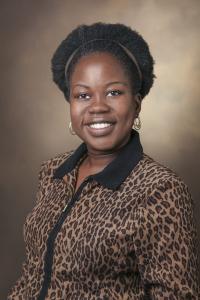Celestine N. Wanjalla, MD, PhD
Dr. Wanjalla is a physician-scientist who received her Bachelor’s degree in Biological Sciences with honors in research from Cornell University and an MD Ph.D. degree from Thomas Jefferson University in Philadelphia. She is a translational researcher who cares for persons living with HIV. Her primary focus is investigating the health implications of virus-specific memory immune cells including cytomegalovirus, in cardiometabolic disease in persons living with HIV. During her post-doctoral training, she defined a subset of CGC+ CD4 T cells, named due to their co-expression of surface markers (CX3CR1, GPR56, and CD57). These cells were largely CMV-specific and were higher in diabetic persons with HIV (PMID: 30941121) as well as in those with a higher carotid plaque burden (PMID: 33567869).
Dr. Wanjalla is the Principal Investigator of an NIH/NHLBI K23 Mentored Career Development Award (K23HL156759), a Doris Duke Clinical Scientist Development Award (Grant #2021193), and a Burroughs Wellcome Career Award for Medical Scientists (Grant # 1021480) to understand the role of anti-cytomegalovirus immune responses in atherosclerotic cardiovascular disease in persons living with HIV. She was also selected as a member of the NHLBI Future faculty of Cardiovascular sciences (Cohort 3), and her small research project is on B Cell Subsets and Atherosclerosis in Persons with HIV.
Through these awards, she will be conducting basic immunology studies to fully characterize the CGC CD4+ T cells, and to what extent they are CMV-specific. She is using endothelial stretch assays to understand the impact of these cells on endothelial function, and macrophage assays to understand the role of CMV on antigen presentation alteration. Digital spatial transcriptomics of coronary arteries from PWH and HIV-negative controls, partly funded by Nanostring, will also be used to understand drivers of inflammation at the coronary artery level. Over the next 3-5 years, her goal is to further develop her career in translational research, build a team of collaborators and trainees and continue to learn from the bedside and investigate new questions that arise
